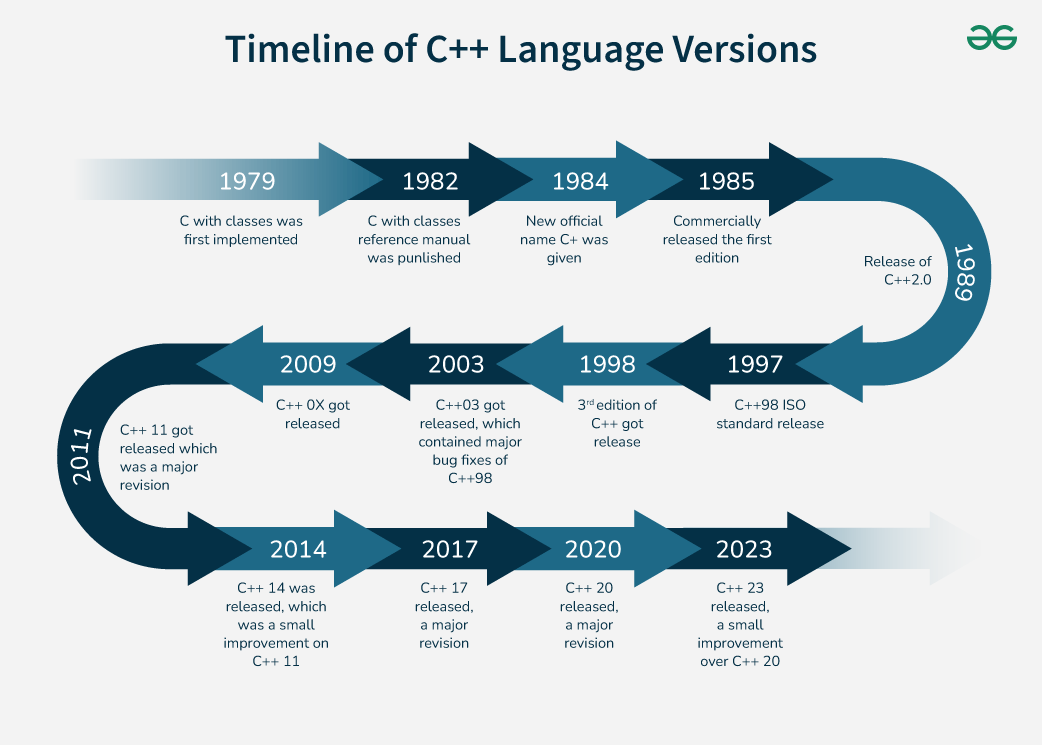Introduction to C++ Programming Language
Last Updated :
14 Jul, 2025
C++ is a general-purpose programming language that was developed by Bjarne Stroustrup as an enhancement of the C language to add object-oriented paradigm.
- It is considered as a middle-level language as it combines features of both high-level and low-level languages.
- It has high level language features like object oriented programming, exception handling and templates along with low-level capabilities, such as direct memory manipulation and system-level programming.
- It is used to build embedded systems, game engines, web browsers, compilers and operating systems.
Applications of C++
C++ is used in a wide range of applications from game engines and application software to operating systems and embedded systems.
Features of C++
The main features C++ programming language are as follows:
- Simple: It is a simple language in the sense that programs can be broken down into logical units and parts, and has a rich library support and a variety of datatypes.
- Machine Independent: C++ code can be run on any machine as long as a suitable compiler is provided.
- Low-level Access: C++ provides low-level access to system resources, which makes it a suitable choice for system programming and writing efficient code.
- Fast Execution Speed: C++ is one of the fastest high-level languages. There is no additional processing overhead in C++, it is blazing fast.
- Object-Oriented: One of the strongest points of the language which sets it apart from C. Object-Oriented support helps C++ to make maintainable and extensible programs. i.e. large-scale applications can be built.
Why Learn C++?
C++ is often taught as a foundational language to aspiring programmers, but it is much more than that:
- C++ remains one of the most used and popular programming languages used in making operating systems, embedded systems, graphical user interfaces and nowadays in high frequency trading (HFT) software.
- It supports both low-level and high-level features such as manual memory management and OOPs programming respectively.
- Syntax similarity with C, Java, and C# makes it easier to switch languages.
- C++ provides one of the fastest execution speeds among high level languages, which can be a deciding factor in Competitive Programming or high-performance applications.
First C++ Program
The below C++ code shows the basic structure of a program. Learn more about how it works in this article.
C++
#include <iostream>
using namespace std;
int main() {
cout << "Hello, World!";
return 0;
}
Explanation: In the above example, we simply print a statement, which is "Hello, World!" through C++ programming language.
History of C++
C++ is an object-oriented, middle-level programming language developed by Bjarne Stroustrup at Bell Labs in 1979, originally called “C with Classes” and renamed to C++ in 1983. It extended C by adding features like classes, inheritance, and type checking to support object-oriented programming. Over time, it evolved through standards like C++98, C++11, C++17, C++20, and the latest C++23, adding modern features for performance and safety. Today, C++ remains widely used in system software, game engines, competitive programming, and high-performance applications. Read more about history here.

C++ vs Other Programming Languages
Let's see where C++ stands as compared to other programming language:
| Feature | C++ | C | Java | Python | JavaScript |
|---|
| Type | Compiled | Compiled | Compiled and Interpreted | Interpreted | Interpreted |
|---|
| Paradigm | Multi-paradigm (procedural, object-oriented, generic) | Procedural, structured | Object-oriented, structured | Multi-paradigm (object-oriented, procedural, functional) | Multi-paradigm (event-driven, functional) |
|---|
| Memory Management | Manual | Manual | Automatic | Automatic | Automatic (with garbage collection) |
|---|
| Syntax | Complex | Complex | Complex | Simple | Simple (but can be more complex with frameworks) |
|---|
| Use Cases | System programming, game development, high-performance applications | System programming, embedded systems, game development | Large-scale applications, enterprise software | Web development, data analysis, machine learning | Web development, server-side scripting, mobile apps |
|---|
| Notable Frameworks/Libraries | Standard Library, Boost | Standard Library | Spring, Hibernate | Django, Flask | Node.js, React, Angular, Vue, Express |
|---|
| Community Support | Strong | Strong | Strong | Strong | Strong |
|---|
| Job Market | Abundant | Abundant | Abundant | Abundant | Abundant |
|---|
